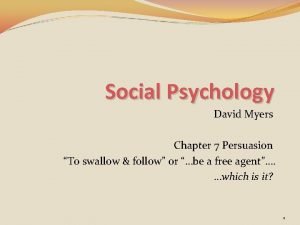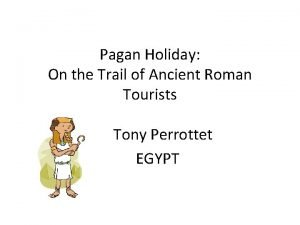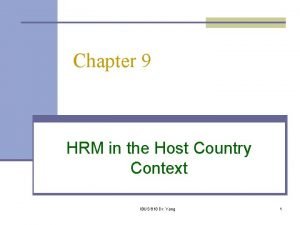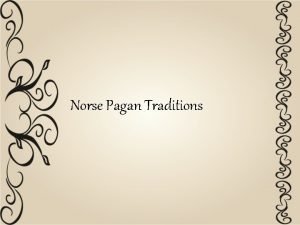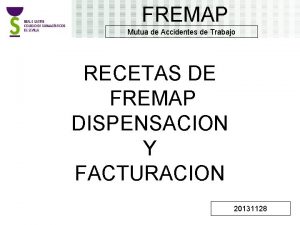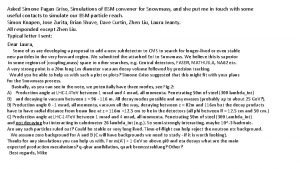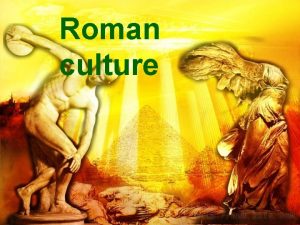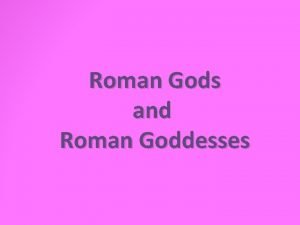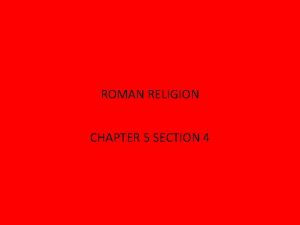Roman Religion Paganism State Religion Cults Pagan country









- Slides: 9


Roman Religion Paganism – State Religion Cults “Pagan” – country dweller õadapt Greek Gods to meet urban needs õGods are modified to exhibit Roman values õhoused in Pantheon õevolves into emperor worship Astrology / Magic õBabylonian origins õpopular among masses of gullible Romans Female õIsis [Egypt] – nurturing priests & priestesses õCybele – [Asia Minor] frenzied - self-castration Mysteries õEleusinian Mysteries – overcome fear of death õMithraism – Zoroastrian very popular, especially among soldiers Christianity [Judaism] õmonotheism precludes emperor worship õpersecuted as threat to state, scapegoats õunderground movement – catacombs õperiods of tolerance and growth

Roman Philosophy Materialistic & Practical – deals with Roman realities How does one live well in a decadent society? All imported from Athens

Epicureanism – founded by Epicurus (341 -270 BC), based on Democritos Roman adherents: Lucretius (96 -55 BC), Horace (65 -8 BC) ØSoul perishes with body ØDeath is both extinction and liberation ØPleasure, not virtue or justice, is the ultimate good ØIntellectual pleasure over sensual ØModeration over hedonism ØReligion and belief in afterlife only cause fear ØFollowed by a cultivated minority

Stoicism – founded by Zeno (335 -263 BC), based on Herakleitos Roman adherents: Seneca (3 BC – AD 65), Epictetus (AD 60 -110), Marcus Aurelius (AD 121 -180) • Senses over metaphysics • Everything real is solid matter (including the soul) • Cosmic determinism – everything determined by Logos • Must seek harmony with nature • Virtue is the sole good in an individual’s life • Virtue is a matter of will power • An individuals actions determine good or bad outcomes • Austere and sober – avoid all passions

Neo-Platonism – taken from the Academy in Athens v Ideas are true reality / Ideas are unknowable v Goal is to approach these Ideas as closely as possible v True Reality comes after death v A good life leads to salvation v most religious Roman Philosophy v lays philosophical foundation for Christianity

Roman written/verbal arts LANGUAGE: õ Latin is a major unifying force Contradiction: Source of intense pride BUT Educated Romans use Greek õ Both languages used in administering the Empire PRESERVATION: õ Rome becomes the guardian of the Greek/Hellenistic legacy

ORATORY: õMandatory in such a political society Cicero Seneca HISTORY: õDestiny chronicled & Propaganda Cicero Livy Tacitus LITERATURE: õVirgil [70 -19 BC] – commissioned by Caesar Augustus To write Aenead for imperial propaganda Aeneas is the literary model of Roman virtues õCatullus [84 -54 BC] – lyric poetry õHorace [65 -8 BC] – odes espousing Epicureanism õMartial [AD 40 -104] – epigrams: satirical & sardonic criticisms

EDUCATION: õ Parental responsibility – highly valued õ Pragmatic – State, not individual oriented õ Development of the “Academic Curriculum” LAW: õ justice Based on reality, not Abstraction õ Main purpose – keep tax revenues flowing Implied: Constitutional Rights Consent of the Governed
